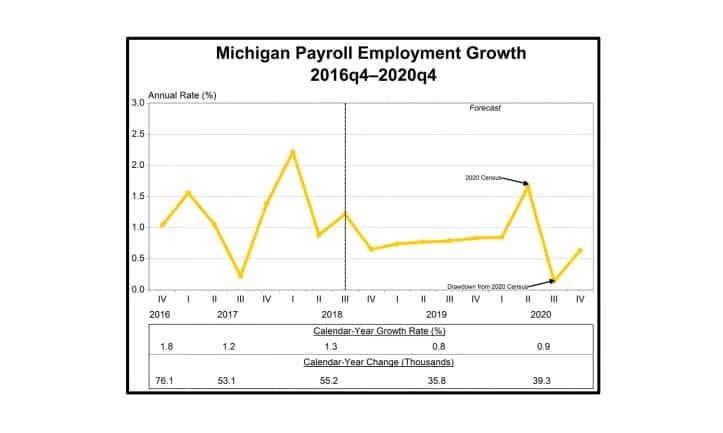Here’s a statistic anybody can be thankful for in this season of Thanksgiving: Michigan has now racked up nine straight years of uninterrupted job growth between the fall quarters of 2009 and 2018. Here’s another slice of economic pie for you to enjoy this week. University of Michigan Economists are predicting that the state will add another 35,800 jobs in 2019 and 39,800 more in 2020.
As Gabriel Ehrlich, Director of the U of M’s Research Seminar in Quantitative Economics, suggests, “We are thus poised to set a new record for the longest period of job expansion in Michigan since the World War II era.”
Ehrlich and his colleagues hosted the University of Michigan’s 66th Annual Economic Outlook Conference on Thursday and Friday of last week, and he reports that after looking back on data dating to 1939, “Michigan’s current streak of yearly job growth now matches the longest previous episode of job recovery.”
While that’s all good news, reality is that there’s some mixed concerns in there that show job growth slowing down as the labor market continues to tighten due to the skilled trades gap everyone in manufacturing and beyond is encountering.
Michigan’s payroll employment growth was 76,100 new jobs in 2016, dropped back to 53,100 last year, and is projected to settle in the range of 55,200 this year. Thus, the projection of 35,800 new jobs in the year ahead begins to pale due to that slower growth pattern driven by fewer people to hire from.
Ehrlich and his research team say that Michigan’s pace of job creation cooled from an annualized 2.2-percent in the first quarter of 2018 to an average of 1.1-percent in the second and third quarters. He says, “We expect growth to drop off a bit further in the fourth quarter before inching up slightly in 2019.” He adds, “The path of quarterly growth in 2020 is complicated by the 2020 Census, but job growth settles in at an annual pace of 0.6-percent by the end of 2020.” That would have job growth averaging 0.8-percent year over year from 2019 to 2020.
Ehrlich and crew also expect Michigan’s unemployment rate to “tick up a bit from its September reading of 4.0-percent to 4.1-percent in the fourth quarter of 2018.” He adds, “It then declines to averages of 3.9-percent in 2019 and 3.8-percent in 2020.” That sort of level in 2020 would be the third-lowest annual average since the modern vintage data began in 1976.
On the monetary front, the research team suggests, “Driven largely by higher gas prices, local inflation picks up from 2.1-percent in 2017 to 2.5-percent this year, on pace with the U.S. inflation rate,” adding, “We see local inflation moderating to 1.9-percent next year and 2.0-percent in 2020, as the recent increase in energy prices recedes into the rearview mirror.”
Looking at the category of personal income, the new report suggests that nominal personal income growth accelerates by two-tenths of a percentage point to 3.76-percent in 2018, helped by strong growth in wage and salary income and a large increase in transfer income. They also note, “Income growth stays roughly steady in 2019 before jumping to 4.3-percent in 2020.” The acceleration that year is driven by a pickup in the wage and salary, proprietors’, and property components of income, reflecting in part the tight labor market and higher interest rates that they foresee.
Additionally, the U of M researchers see the growth of real disposable income ticking up two-tenths of a percentage point from 2017 to 2018, noting, “Its growth in 2018 is boosted by the decreased burden of federal taxation resulting from the TCJA of 2017.” They add, “We see real disposable income growth staying roughly flat next year, as local inflation recedes but the boost from the tax cuts fades. Real income growth jumps by 6/10ths of a percentage point in 2020, reflecting faster nominal growth and stable inflation.
On a national scale, the U of M is expecting the American economy to maintain growth in 2019, “although at a slower rate” as well.






